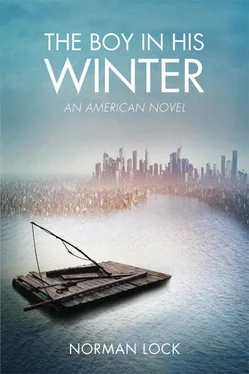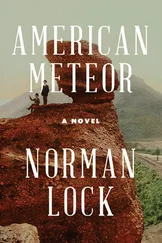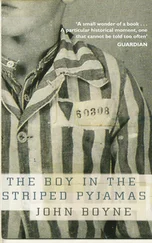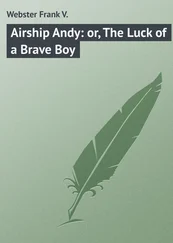I don’t propose to recite the itinerary of our river journey, my last, as it turned out (unless another awaits me beyond time’s final reach). In any case, I don’t remember the places where we stopped. My thoughts were centered on Jameson, who was herself the beauties of the way. I can’t recall the rails on which we slid, according to love’s commissioning, from affection into attraction. Like the rivers themselves, the passages down which we moved were unmarked. We struggled at once to cleave and to fend off — the countervailing motions of the bewildered heart.
I do remember the drawings she made while the boat took us deeper into Europe and ourselves: a boy tying a rope to a deck cleat, a boy at the wheel, a boy — always the same boy, whose given name she made my own: Albert. Albert opening a canal lock; fishing with a net for eels; reading in his berth; shivering after an evening’s swim in the Rhine. There were many other drawings — all framing the boy as he traveled, like us, on rivers that became increasingly uncertain of their course. Life — even one as long as mine — had left me unprepared for love. I realized with a start that I had never before loved anyone, except maybe Jim. I kept an eye on the river, whose bends followed hard on one another much too fast to be careless at the helm. But I was helpless not to steal a glance at Jameson as she sketched and smudged, scrumbled and grumbled over her failure to seize with her pencil what her eyes saw. She took a miniaturist’s delight in details: of the boat, a weathered pier, or an elm branch, still oddly leafed, lumbering along in the current. She was transfixed by the story unfolding — in pictures and in words — while the river unfolded from reach to reach. At night, we tied up to the bank or, when the river was wide enough, moored out toward the middle — the better to be alone.
You will have read enough about love to make the recounting of mine unnecessary. Passion bores me; maybe I’d think otherwise if I were not an old man. I’m not sure I can speak the language now. I wonder if I ever could with the effortlessness of those who do not seek each other in the dim bowers of their selves, but, rather, in sunlit uplands — or on a boat traveling between untroubled shores. We must have stopped often during the three hundred miles of that fateful, if uneventful, trip. (God-damn the unalterable courses it seems our lot to bear!) We halted for fuel, food, water, to stretch our legs. But I can’t recall anything other than a sensation of contentment and a genial peace. Jameson and I might have been in the peaceable kingdom painted by Hicks, speaking to each other in the sensual language promised by Jakob Böhme, for all I remember of the way. Doubtless, it had its excitements. After all, I was in love, although I’ve never known the fits and seizures of a heart besotted like Jim’s for his mad mermaid of the mud. Mine was joy in a quiet harbor. All the same, the journey was marvelous. Not even the hyperbolic baron could have imagined one more marvelous than ours. I was entranced as I had not been since the days on the raft. But time tick-tocked on the Rhine as it had not on the Mississippi for Jim and me.
You want to know about our rough-and-tumble in bed, on the ottoman, the deck chair, and foredeck sun pad? Forgive me, but I haven’t juice enough to indulge a salacious interest. We had sex, naturally. Leave it at that.
“Have you read The Adventures of Huckleberry Finn ?” Jameson asked me one night while we lay in a drowse, listening to the stiff noise of reeds scraping against the hull, the soft music of water lapping there. The portholes were opened to the night, which stole into the cabin, already nervous in the wavering tides of shadow. There was something in the air: a disturbing odor compounded of sluggish water and compost.
“No,” I said, and quickly changed the subject in order to be rid of the hated book. “Tell me the story you’re writing. What’s it called?”
“ The Boy in His Winter, ” she said. “At least, that’s the working title.”
I thought that strange and asked her what it meant.
“The story’s told by an old man looking far back into the past at his boyhood. From that vantage, he can see things clearly without the haze of childhood to soften and alter them.”
She was too young to know how old age also has a haze that can dissemble, according to the dying mind’s insults and injuries, or its senile happiness. She went on to tell me the story, which I have forgotten. And then we — what’s the romantic expression? We fell into each other’s arms and slept.
Forty miles below Koblenz, in the Rhine Gorge, where, on a granite cliff, Lorelei once caused ships to founder and men to drown, she received an e-mail message from her brother: Father died unexpectedly last night. Massive stroke. Funeral Friday.
“You’d think he was sending a telegram — he’s so frugal with his words,” she said; and I heard in hers a reproach that hid her grief.
“I’ll turn around and head for Cologne. You can get a flight there for the States.”
Jameson looked at me. I saw in her candid gaze a question, which I answered impulsively but not — as things turned out — rashly.
“I’ll go with you, if you like.”
She nodded, then went below to mourn or pack, or both, while I turned the boat around. Before we left it at the wharf in Cologne, I had e-mailed my resignation to the chairman of Chronos Yachts and to the beautifully dressed mannequin in Palm Beach, whose face I no longer recall.
JAMESON AND I FLEW TO AMERICA. As the plane neared the eastern seaboard, the captain began to talk over the PA system. He spoke lovingly of the sea. As a young man, he wished above all else to become a sailor. (How strange the convergences of life!) I looked out the window at the little lights shaking on the black ocean.
“Fishing boats,” the captain said, as if he could read my thoughts.
The interior of the plane was dark. Jameson and the other passengers were asleep — all, that is, except me. The window was cold against my forehead. The sun was waiting for me over the brink of the western world and beyond “the Territory,” which in Huck’s childhood marked the limit of our imperial destiny. Behind the locked cockpit door, the captain talked softly.
“I dream,” he said, “of sleeping with Madeleine, a stewardess on the Paris — New York flight. We met only once, in a small hotel on the Trocadero. We stood together at the window and looked at the Eiffel Tower. It was a moment of high romance. When the light went out of the sky, we went to bed.”
He described her lingerie, her eyes, the shape of her mouth. Her hair, he said, was “like mahogany”—the color and the shine of it. He described his ecstasy as the Eiffel Tower loomed in at the window, its lights trembling against the Parisian night. The captain fell silent while the great black wings dipped. A beverage cart rolled slowly down the aisle. Then over the PA, I heard a sound like water over stones. Like rain. Like the sea. It was the sound of the captain weeping. The plane stopped, lingered in midair — a dream. I touched my forehead to the cold window, and the plane continued on to LAX.
IN CALIFORNIA, I SOUGHT AN END to movement, which had — outside of time and in it — bewildered and exhausted me. I have theorized, since returning to Hannibal like an elephant at the end of its road, that the Pacific coast summoned so many of us so that we might finally be rid of restlessness. We went, not for gold, oil, oranges, or Hollywood, but to be finished with the westering tide that began — centuries ago — in the British Isles, Europe, and in Africa (bringing Jim to me, no matter how he may have fought and suffered by it). We sought cessation at the edge of the blue ocean and relief at stopping in our tracks. Until we’ve stopped, how else are we ever to begin? This is what I think, and it is the case for me, who had never stopped, never truly made a start or loved or been happy until I settled by the Pacific Ocean with Jameson. Maybe that is what the book will be about: not Huck Finn’s or Albert Barthelemy’s journeying, but their having reached a final destination — save one.
Читать дальше












